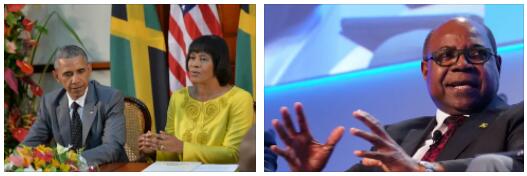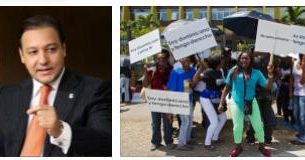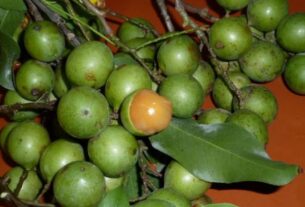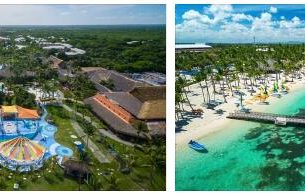The 1962 constitution provides for the “Westminster model” of organizing the political system (see Antigua and Barbuda), parliamentary democracy. Administratively, Jamaica is divided into 14 parishes. Largest cities: Kingston, Spanish Town, Montego Bay, May Pen. The British dominion, the head of state is the Queen, represented by the Governor General (since 1991 – H. Cook). In the 2002 parliamentary elections, the largest parties in Jamaica were in favor of a republican form of government, if it is approved in a referendum. The ruling party considers it expedient to assign the functions of the head of the executive branch to the president and elect him through general elections, the opposition supports the idea of a parliamentary republic, in which the president should play a representative role and be elected by parliamentarians. Check diseaseslearning for political system of Jamaica.
Legislative power belongs to a bicameral parliament consisting of a House of Representatives with 60 deputies elected once every 5 years by direct universal suffrage by a majoritarian system, and a Senate of 21 members appointed by the Governor General. 13 senators are nominated by the ruling party, 8 by the opposition. The executive power is a government consisting of 17 people, consisting of parliamentarians, of which from 2 to 4 people. must be senators. The Prime Minister is the leader of the parliamentary majority, since 1992 P. Patterson.
Local self-government is represented by 13 parish councils and the Corporation of Kingston – St. Andrew, which manages the capital, elections for which take place 1 time in 3 years. In 2003, the Law on Municipalities was adopted, which provides for the creation of independent authorities from parish councils in cities, the mayors of which are directly elected.
The most prominent political figure in Jamaican history was N. W. Manley. Born in 1893. Founder in 1938 of the country’s oldest People’s National Party (PNP) and its first leader. The party he led achieved the introduction of universal suffrage. From 1955 to 1959 he was Chief Minister and from 1959 to 1962 he was Prime Minister of Jamaica. During his tenure in power, the country achieved serious economic and social successes, there was a diversification of the economic structure, per capita income almost doubled, and the country was ahead of all the independent states of Latin America in terms of enrollment of school-age children. He died in 1969. Recognized as a national hero of Jamaica.
The country actually has a two-party system. The NNP is the oldest social democratic party in Latin America, a member of the Socialist International since 1939. For a long time it was on the left flank of the political spectrum. During its tenure in power in 1972–80, the NNP pursued a course of socialist orientation. The most important industries were nationalized, several state economic management organizations were created, foreign companies operating in the field of mining and processing bauxite were transformed into mixed enterprises with the participation of state capital, poverty and illiteracy were fought, Jamaica actively participated in the Non-Aligned Movement and cooperated with Cuba. In 1980-89 – in opposition. She returned to power in 1989, abandoning her former economic course. In the elections in 2002 received 52, 2% of the vote and 34 seats in the House of Representatives. Leader – P. Patterson. The Labor Party of Jamaica (LPJ) was founded in 1942. It follows a policy of developing the private sector and cooperating with foreign capital. Was in power in 1944-55, 1962-72, 1980-89. Since 1989, in opposition, in the 2002 elections she received 47.2% of the vote and 26 seats in the lower house. Leader – E. Siaga. The National Democratic Movement, organized in 1995 by a group of politicians who left the LPJ, advocates a clearer division of powers between the legislative and executive branches of government. In the 1997 elections, she received 38.4 thousand (5% of the vote), in 2002 – only 2.8 thousand (0.7%). Leader – H. Bennett. in 2002 – only 2.8 thousand (0.7%). Leader – H. Bennett. in 2002 – only 2.8 thousand (0.7%). Leader – H. Bennett.
In the field of domestic policy, the main tasks are the modernization of the economic structure through the introduction of information technology, poverty reduction, the fight against criminal and domestic crime, external – deepening cooperation within the framework of CARICOM and joining the American Free Trade Area.
The Defense Forces were created in 1962 and consist of a regular army of 2,830 men. and a battalion of reservists numbering 950 people. The principle of formation is contractual, the contract term is at least 1 year, for technical personnel – 5 years. The ground forces include two combat battalions, a support battalion and engineering units. Coast Guard of 187 people. has 8 patrol boats. Aviation (140 people) is armed with helicopters and light propeller-driven aircraft. In Kingston there is a cadet corps.
Jamaica has diplomatic relations with the Russian Federation (diplomatic relations with the USSR were established in 1975).



